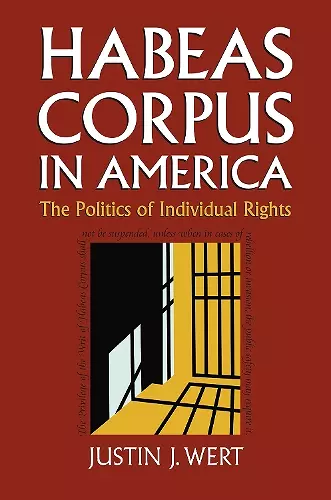Habeas Corpus in America
The Politics of Individual Rights
Format:Paperback
Publisher:University Press of Kansas
Published:30th Sep '23
Should be back in stock very soon

For most Americans, habeas corpus is the cornerstone of our legal system: the principal constitutional check on arbitrary government power, allowing an arrested person to challenge the legality of his detention. In a study that could not be more timely, Justin Wert reexamines this essential individual right and shows that habeas corpus is not necessarily the check that we've assumed. Habeas corpus, it emerges, is as much a tool of politics as it is of law. In this first study of habeas corpus in an American political context, Wert shifts our collective emphasis from the judicial to the political—toward the changes in the writ influenced by Congress, the president, political parties, state governments, legal academics, and even interest groups. By doing so, he reveals how political regimes have used habeas corpus both to undo the legacies of their predecessors and to establish and enforce their own vision of constitutional governance.
Tracing the history of the writ from the Founding to Hamdi v. Rumsfeld and Boumediene v. Bush, Wert illuminates crucial developmental moments in its evolution. He demonstrates that during the antebellum period, Reconstruction, Gilded Age, Great Society, and the ongoing war on terrorism, habeas corpus has waxed and waned in harmony with the interests of majoritarian politics. Along the way, Wert identifies and explains the political context of fine points of law that many political scientists and historians may not be aware of—such as the exhaustion rule requiring that a federal habeas participant must first exhaust all possible claims for relief in state court, a maneuver by which the post-Reconstruction Court abandoned supervision of race relations in the South.
Especially in light of the new scrutiny of habeas corpus prompted by the Guantnamo detainees, Wert’s book is essential for broadening our understanding of how law and politics continue to intersect after 9/11. Brimming with fresh insights into constitutional development and regime theory, it shows that the Great Writ of Liberty may not be so great as we have supposed—because while it has the potential to enforce conceptions of rights that are consistent with the best ideals of American politics, it also has the potential to enforce its worst aspects as well.
An impressive and engaging account of how the Great Writ, designed as a fundamental protector of liberty, has been shaped and misshaped by political forces. Wert’s history is a clarion call for a reaffirmation of the writ at its best." - David Cole, author of Terrorism and the Constitution
"An excellent and much-needed study that focuses our attention on the politics that have always surrounded this important right." - Keith E. Whittington, author of Constitutional Interpretation: Textual Meaning, Original Intent, and Judicial Review
"An innovative history of habeas corpus that enhances our understanding of the way in which courts are part of political regimes." - Mark Tushnet, author of Why the Constitution Matters
ISBN: 9780700636020
Dimensions: unknown
Weight: 272g
302 pages